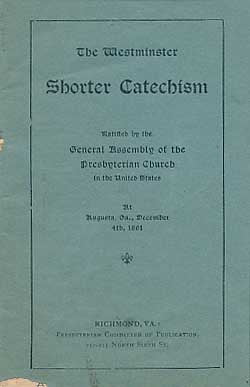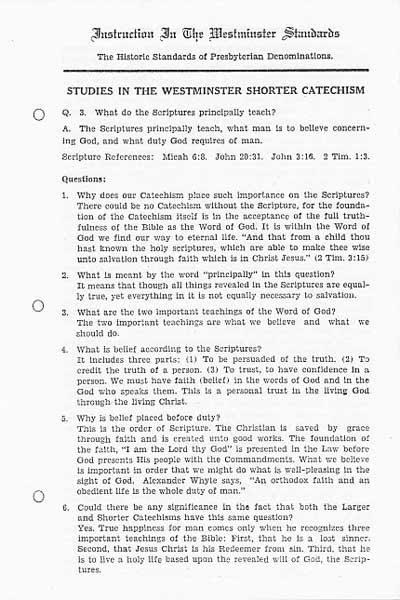This Day in Presbyterian History:
An Outline of the Bible
 Turning again to the Shorter Catechism, and specifically, question and answer number 3, the Catechism asks “What do the Scriptures principally teach?” And the answer provided by the Westminster divines is “The Scriptures principally teach what man is to believe concerning God, and what duty God requires of man.”
Turning again to the Shorter Catechism, and specifically, question and answer number 3, the Catechism asks “What do the Scriptures principally teach?” And the answer provided by the Westminster divines is “The Scriptures principally teach what man is to believe concerning God, and what duty God requires of man.”
The two questions and answers before this, which we considered on January 13 and January 29, were introductory in scope. For example, the foundation of all religion is summed up in the first question and answer regarding the chief end of man, being, namely, to glorify God and enjoy Him forever. The second introductory question and answer tells us in addition, that the source of all religion are the Scriptures of the Old and New Testaments.
Now, with these two introductory answers presented to us, the catechism we study today constitutes the outline summary of the entire Shorter and Larger Catechism. What we are to believe concerning God, or faith, doctrine, or theology, will be summed up in questions and answers 4 – 38 of the Shorter Catechism, and questions and answers 6 – 90 of the Larger Catechism. What duty God requires of man, or duty, life, or practical theology, will be summed up in questions and answers 39 – 107 of the Shorter Catechism, and questions and answers 91 – 196 of the Larger Catechism. Here are what the Scriptures principally teach.
We focus in on the word “principally” first. What is meant by this word is that there are other truths in Scripture for us to believe and receive, but the most important, or principle thing is, what we are to believe concerning God and what duty that faith calls us to in this life. Doctrine and duty sums up the Biblical record.
What are we to believe about God first? Subsequent answers in both catechisms will make known to us what God is, the persons of the Godhead, the decrees of God in creation and providence, and their execution. Most important, the decree of God and its execution in redemption, considered from eternity past, in time, and into eternity future, will be seen in both the Old Testament and the New Testament. There will be seen a progressive revelation in redemption, found both in the person and work of God’s Son, Jesus Christ.
And we are to “believe” these truths, our Confessional fathers tell us. Alexander Whyte tells us that “belief is the assent of the mind to what is told us on competent and credible authority. We are said to believe when we are convinced of a fact without our having had immediate and personal knowledge of it. Belief and faith are precisely the same state of mind.” (Whyte, A Commentary on the Shorter Catechism, p. 7)
Second, we are told that the Scriptures teach us the duty God requires of us. Belief in God and in His Son, Jesus Christ, will never stand alone. It is faith alone which saves us, but the evidence of that saving faith will always be good works. To be without the latter is to give evidence that the former is not real in us. There is such a thing as dead orthodoxy. Faith is not a genuine faith unless it leads to a biblical practice.
So as you read, or study the Bible in your daily readings, such as our “Through the Scriptures” sections of each day, ask yourself by self-examination, “what doctrine is God asking me to believe from this passage,” and “what duty does God want me to obey in my spiritual life today.” Then and only then will the Word of God be profitable for you.
Words to Live By: An orthodox faith and an obedient life is the whole duty of Christians. They must know what they believe and how to put it into practice. To hear the Bible only and not be doers of it, is hypocrisy. Let us be sincere before the Lord and carry out before man, especially those of the household of faith, what we believe.
Through the Scriptures: Exodus 32 – 34
Through the Standards: Divine providence in the catechisms:
WLC 18 – “What are God’s works of providence?
A. God’s works of providence are his most holy, wise, and powerful preserving and governing all his creatures; ordering them, and all their actions, to his own glory.”
WSC 11
A. “God’s works of providence are, his most holy, wise, and powerful preserving and governing all his creatures, and all their actions.”
 A Similar Voice:
A Similar Voice:
“Does It Matter What We Believe?,” by Leonard Van Horn [1920-2005]
Our title is rapidly becoming a popular question of this age within the walls of the church. Back some years ago the cry was, “No Creed but Christ!” This slogan was accepted by many and led many away from established systems of belief. As a dangerous trend in the life of the church, this departure prompted some to look for “revelations” outside of the revealed Word of God. Even this trend though can not be compared to the danger that is spreading throughout the church today, the danger of suggesting what we believe is not really important.
It is important to note that Question No. 3 of the Shorter Catechism places the matter of our belief in a prominent place. Our Lord did the same thing. In Matthew 22:37, 38 he says, “Thou shalt love the Lord thy God with all thy heart, and with all thy soul, and with all thy MIND.” The Bible leaves no doubt in the mind of anyone that what we believe is important.
Today in many Presbyterian churches there is a prejudice against creeds, against doctrine. This is shown in our failure to teach our Standards. It is also seen in the failure always to insist that candidates for the ministry be thoroughly conversant with the Standards. Again it is seen in the growing emphasis within the church today of obedience to the church as an institution without regard to the teaching of the Bible or of the accepted Creed.
Does it matter what we believe? It certainly does, if we are going to be a confessing body. It certainly does, if we want to continue to hear a gospel message in our church. The very heart of the gospel message is that we may receive the gift of salvation by believing (trusting) in Christ as our Saviour. Without this act of faith or belief we are lost, with it we are saved. Thus what we believe does make a difference, namely, where we shall spend eternity — heaven or hell.
It is equally true that it matters what we believe because the duty which God requires of us is based on what we believe. The widely accepted definition of belief is that “it is the assent of the mind to what is told us on competent and credible authority.” Our Standards contain the system of doctrine taught in the Holy Scriptures. Therefore any indifference to doctrine, any attempt to bypass or alter it to suit modern man, any movement to permit, as acceptable practice, less than a complete commital to our doctrinal standards should be recognized as contrary to historic Presbyterianism.
Excerpted from “Studies in the Westminster Shorter Catechism” by the Rev. Leonard T. Van Horn. Port Gibson, MS: The Shield and Sword, Vol. 1, no. 3, March 1961. Rev. Van Horn was one of the founding fathers of the PCA. His work on the ruling elder remains in print and is available from the PCA Bookstore. Copies of Rev. Van Horn’s studies on the Shorter Catechism are scarce, but we are grateful to have a set preserved at the PCA Historical Center.
